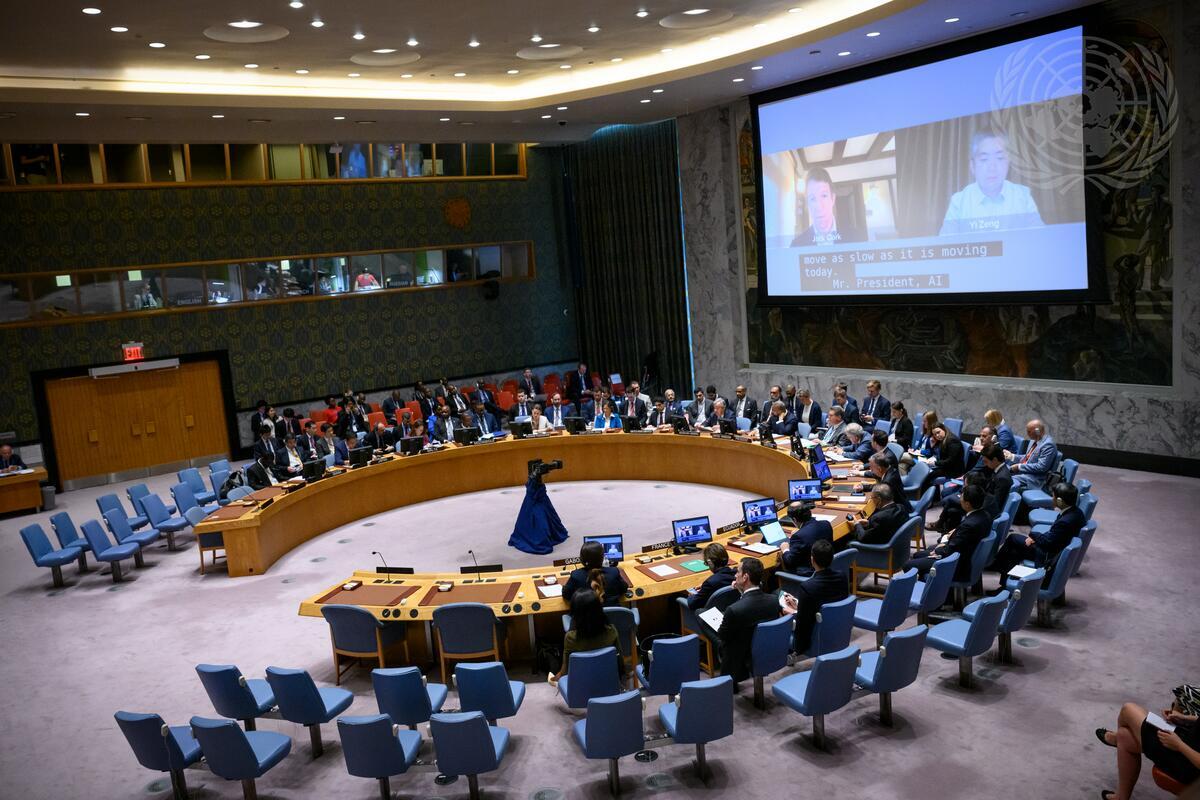UN Security Council holds first meeting on AI

A wide view of the first ever United Nations Security Council meeting on artificial intelligence (AI). This meeting, convened by the United Kingdom, addresses the topic “Artificial intelligence: opportunities and risks for international peace and security.” UNITED NATIONS/Loey Felipe
July 25 (ZFJ) — The rapid increase in malicious uses of artificial intelligence has sparked international concern. On July 18, the United Nations Security Council gathered to recognize what AI could bring to the table and what it has already taken away.
U.N. Secretary-General António Guterres opened the meeting by observing the influence ChatGPT has garnered. ChatGPT, an AI that emulates human interaction, has taken over the internet by storm, infiltrating college applications, political propaganda, jobs, and other areas of daily life.
He described its rapid growth, saying, “while it took more than fifty years for printed books to become widely available across Europe, ChatGPT reached 100 million users in just two months.”
AI systems and technology have great potential in bridging social, political, and digital gaps, but they carry a threat of equivalent magnitude. AI-generated images of former President Donald Trump being detained by police officers and a photo falsely depicting an explosion at the Pentagon have already created media turbulence in the past.
China’s representative, Zhang Jun, noted that AI is a “double-edged sword,” explaining that it “depends on how mankind utilizes and regulates it.” Without the correct set of rules and regulations, the international community jeopardizes the future and security of nations.
United Arab Emirates representative Omran Sharaf pointed out the urgency in forming an agreement as soon as possible. He stated there is “a brief window of opportunity available now where key stakeholders are willing to unite and consider the guardrails for this technology.” He continued on to explain that UN member states should work to find common ground on regulations “before it is too late.”
Co-founder of Anthropic, a company specializing in developing AI systems and language models, Jack Clark highlighted two significant qualities of AI: its “potential for misuse and its unpredictability.” Without moderation and humanity, AI and its talents can be taken and weaponized. In an example, Clark stated that “while an AI system can improve understanding of biology, it can also be used to construct biological weapons.”
Questions on the militarization of AI were brought to light by Ecuador’s speaker, Hernán Pérez Loose. Amidst the Russia-Ukraine war, he observes, the dangerous potential of AI has come to life. The technology plays an integral role in geospatial intelligence and satellite imagery recognition. This advancement led Loose to reinforce his stance on rejecting the militarization of AI, stating, “the robotization of conflict is a great challenge for our disarmament efforts and an existential challenge that this Council ignores at its peril.”
France’s speaker, Nicolas de Rivière, backed Ecuador, stating, “AI is liable to heighten cyberthreats and help malicious actors in waging cyberattacks. At the military level, AI must be modified to reflect the nature of conflict.”
Contrary to all the previous stances, Lilly Stella Ngyema Ndong, representing Gabon, described AI as having the ability to “increase the analytical capacity of early warning systems, thereby making it easier to detect emerging threats by analyzing vast quantities of data from various sources very quickly.” This ability to analyze information would allow the U.N. and its peacekeepers in a finer execution of their missions. Sharaf, in addition to his previous argument for rules and regulation, added that excessively harsh prohibitions on the growth of AI could “hamper the evolution of this technology.”
The Russian Federation’s speaker, Dmitry Polyanskiy, questioned whether the council should be debating on the use of AI. He stated, “the issue is discussed in the General Assembly and that duplication of such efforts is counterproductive.” Polyanskiy continued on, “the West has no ethical qualms about knowingly allowing AI to generate misanthropic statements in social networks.”
With many nations finding common ground on the status of AI, the meeting ended with a statement from Secretary-General Guterres, “We need a race to develop AI for good: to develop AI that is reliable and safe and that can end poverty, banish hunger, cure cancer and supercharge climate action [and] an AI that propels us towards the Sustainable Development Goals. That is the race we need, and that is a race that is possible and achievable.”
References
- United Nations Security Council - International Community Must Urgently Confront New Reality of Generative, Artificial Intelligence, Speakers Stress as Security Council Debates Risks, Rewards - https://press.un.org/en/2023/sc15359.doc.htm (ARCHIVE)
- United Nations Secretary-General - Secretary-General Urges Security Council to Ensure Transparency, Accountability, Oversight, in First Debate on Artificial Intelligence - https://press.un.org/en/2023/sgsm21880.doc.htm (ARCHIVE)
- National Defense Magazine - Ukraine A Living Lab for AI Warfare - https://www.nationaldefensemagazine.org/articles/2023/3/24/ukraine-a-living-lab-for-ai-warfare (ARCHIVE)
